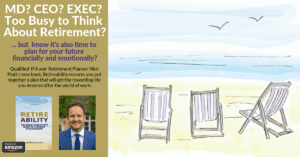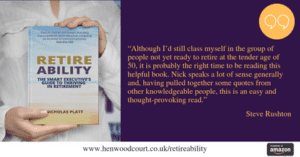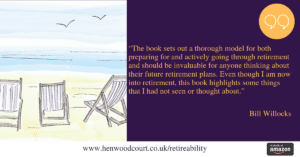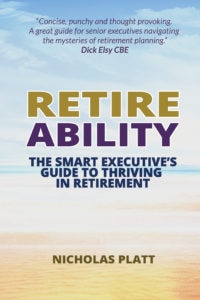COVID19 has made us all rethink our priorities. The professional pressures and demands have been huge in recent months, and we’ve all suddenly realised – if we didn’t already – how much our health and wellbeing really does matter. At the same time, no one has been left unaffected by the financial implications of the virus – with the impact on both private and public sector finances due to remain with us for the medium- to long-term.
It’s no wonder therefore that many executives are considering what all this means for their retirement and their retirement planning. Are leaders going to be able to manage the pressures and demands, whilst also planning ahead for transition and for a comfortable and enriching retirement?
Legal & General recently estimated that one in six people aged over 50 and in work (15%) believe that they will delay retirement, while 26% anticipate having to keep working on a full or part-time basis indefinitely, due to the impact of the virus. On average, those who plan to delay their retirement expect to spend an additional three years in work. However, 10% admit they could delay their plans by 5 years or more. These figures are significantly higher for the 26% of over 50s workers who have been furloughed or seen a pay decrease as a result of the pandemic. One in five of these workers will delay (19%) and 38% expect to work indefinitely.
In our own social media survey, only 5% said that Covid-19 will mean they will have to defer their retirement.
So, while for many Covid-19 will have negative consequences upon retirement, for the majority, Covid-19 will not impact on people’s retirement plans. While, in time, I do suspect that the Legal & General estimates will come down as the financial panic subsides.
The Legal & General commentary does not provide the reasons why those surveyed will defer their retirement, but the assumption of course is this is a result of the economic harm the virus has caused.
We should remember that good retirement planning is not just about building up a financial nest egg, it is also about preparing yourself emotionally for retirement; and I have said many time, work and in particularly, working long hours, often a trait of the committed executive, is the worst possible preparation for retirement because it leaves less time to build a life outside of work which you can embrace more of into retirement. 
For some, both financially and emotionally, the impact of Covid-19 will be significant. For some, it will have little or no impact at all on their retirement plans.
From a financial perspective, employees losing their jobs, or the self-employed/business owners having a major income reduction, or even worse business failure, of course this will result in the inability to continue to use their human capital to accumulate wealth (financial capital) that was earmarked to be used for funding retirement, and even worse, they may, where possible, have to dip into their savings, pensions and investments to fund their current lifestyle. This negative financial double whammy will impact on their retirement reserves and reduce their income into retirement, resulting in the sad acceptance of a lower standard of living into retirement, or the need to defer their retirement to work longer to accumulate funds that will recover the reserves they prematurely accessed.
From an emotional perspective, we have undoubtedly witnessed since the outbreak of Covid-19 executives and business owners increase their working hours. As I noted in my book Retireability:
“A career as a corporate executive – caught in the rat race of workaholism and consumerism, and the effect these have – is the worst possible grounding for a successful retirement. It is a massive retirement barrier”.
Living the life as a dedicated employee with a few scraps of time for yourself over a sustained period is the worst possible preparation for a life in retirement. More work simply means less life and less life means it is harder to transition from worker to retiree. So, if working these extra hours as a result of Covid-19 continues, then getting emotionally ready for retirement is going to be a more difficult journey.
Also, I have heard many people say that lockdown has given them a taste of retirement, and for many this has been a sour taste, bored, monotonous, missing people and interaction, if that’s what retirement is about stuff it, I prefer to work. If this is you, I would counsel you not to make such a judgement on retirement during the lockdown phase, where many of our retirees have had their wings clipped being unable to travel or pursue their hobbies.
So, those who find them themselves out of work or working crazy hours, the financial and emotional impact on their retirement planning may very well be negative.
Conversely, many who have built astute financial plans will not be affected by the negative economic consequences of Covid-19, even those who may have recently witnessed a fall in their pension and investment portfolios.
A golfing buddy of mine who was planning to retire told me mid-swing he would be deferring his own retirement because his pension portfolio had fallen by 20%. While, not wishing to mix business with pleasure, this is probably an assumption he has made. A robust pension portfolio strategy will have anticipated such losses at some point in the future, and diversified accordingly so that things we cannot externally control, such as the stock market, do not dictate how we want to live our lives. His retirement deferment is therefore a result of bad planning, or bad financial advice and if he was a client, I would have told him that, as a buddy I did not wish to spoil our game of golf!
 Undoubtedly, for some, Covid-19 is the ‘straw that broke the camels back’ and has motivated them to bring forward their planned exit, enjoying the freedoms lock down has provided, and for some, realising how little they have to spend and still enjoy life.
Undoubtedly, for some, Covid-19 is the ‘straw that broke the camels back’ and has motivated them to bring forward their planned exit, enjoying the freedoms lock down has provided, and for some, realising how little they have to spend and still enjoy life.
So, the conclusion I have drawn is that Covid-19 has had both positive and negative emotional impacts on getting emotionally ready for retirement, while, in the main, the last few months have had negative financial consequences for most, and this will require many individuals to revisit their retirement plans, equally many will have resilient plans in place where the financial impact of Covid-19 will not knock their own retirement plans off track.
More important than ever, now is the time to consider your own retirement planning, to include not just getting your financial retirement strategy in place, but getting your mindset in place to ensure that you are preparing emotionally to be retirement ready.
While it would be naïve to say that these financial issues will not have an impact on people’s ability to retire, it’s important for people to have a strong understanding of the options available to them before concluding that their retirement needs to be delayed or forgotten indefinitely.

For further help please read our four-step guide to thriving in retirement, order a copy of my book or book an appointment with one of our experienced Chartered Financial Planners to review or create your own retirement plan.
Four-Step Guide to Thriving in Retirement
https://henwoodcourt.co.uk/wp-content/uploads/2020/01/the-smart-executives-guide-vis5.pdf
My Book – Retireability – The Executives Guide to Thriving in Retirement
 https://www.amazon.co.uk/Retireability-Transition-Corporate-Executive-Retiree/dp/1910600261/
https://www.amazon.co.uk/Retireability-Transition-Corporate-Executive-Retiree/dp/1910600261/
Book at appointment with one of our advisers
https://henwoodcourt.co.uk/contact/

